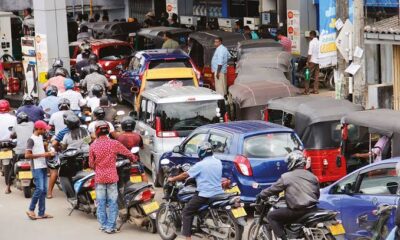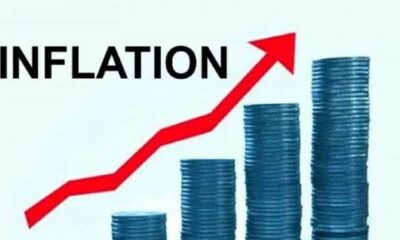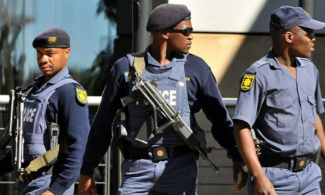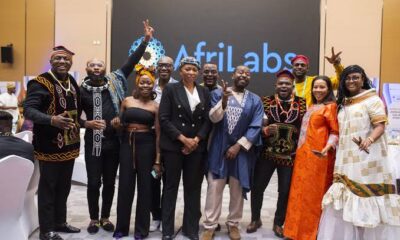Strictly Personal
Will Buhari Vote For Tinubu? By Lasisi Olagunju
Published
1 year agoon

Muhammadu Buhari started his presidency with “I belong to everybody and I belong to nobody.” Will he end as a nobody’s man? Sometimes, and for some, it is gracious to maintain one’s lane, listen to your own vision, single, unattached. French statesman, Charles de Gaulle, who holds the copyright of “I am a man who belongs to nobody and who belongs to everybody” deeply said on another occasion that “If Joan of Arc had married, she would no longer have been Joan of Arc.” Whatever that means – Joan was 15th century France’s iron lady of war and vision. Immolated at age 19, she had no time for men and marriage and family but she is remembered forever as a saviour of France and its patron saint. Buhari, from what we’ve seen of his years, is no Charles de Gaulle and definitely not Joan of Arc to Nigeria. And after benefiting from a political marriage, can Buhari be neutral, truly non-aligned in the 2023 presidential contest? Will he? If he won’t, where is he?
I will be shocked if I am the only person who wonders where Buhari belongs between PDP’s Atiku Abubakar and APC’s Bola Tinubu, two bosom friends fighting over the president’s seat. You know Atiku’s party and Bola Tinubu’s party and the zero-sum ground they hold. The two were part of a national coalition that made Buhari’s presidency possible in 2015. There are persons who vow that for that reason, undergirded by reasons of region and religion, Atiku may in 2023 get Buhari’s vote or, at worst, get him not to lift a finger for the APC and its Èmi l’ókàn candidate. Very interestingly, Buhari clocked 80 on Saturday and Atiku, candidate of the main opposition party, not only issued a statement to celebrate the APC president, he instructively placed newspaper advertisements for him. So, what is happening?
Two months to a presidential election, Buhari is not canvassing votes for his party; he is asking Nigerians to vote for any candidate they fancy. That is strange. We saw President Barack Obama with candidate Hillary Clinton throughout the Democratic Party’s campaigns of 2016. One newspaper (New Telegraph) reported two days ago that “Tinubu’s men fret over Buhari government’s aloofness.” Reporters hear stories. That was not the first time I had heard of grumbling and rumbling in the ruling party over presidential social distancing in the APC campaigns. I know the Lagos content of the APC and their supporters are wondering why Buhari has refused to be part of their candidate’s globe-trotting campaigns. I know you would say that the president was at the flag-off of the campaigns at the Rwang Pam Township Stadium in Jos on November 15, 2022. Was his presence real – body and spirit? Someone said ‘they’ begged the president not to disgrace ‘them’ by not being physically there. If that is true, his presence, therefore, may be what the Yoruba call gbà jé n sinmi (take, let me rest).
The newspaper report is worth quoting copiously and I am doing so because it appears to tally with what I have heard in low tones in several APC crevices. I quote the report: “I must tell you that the situation that we (Tinubu’s supporters) have found ourselves is that of an abandoned orphan. It’s unfortunate that we have been left in the cold by government that was elected on the platform of our great party, the APC…We are campaigning like an opposition party just jostling for power and not like a party in power, which is very unfortunate. Though we recognise that the president has a busy schedule that would have prevented him from being at many of the rallies of the party, I don’t think he has demonstrated sufficient interest to know the situation of things with the campaign efforts.” The New Telegraph said that its source, “an influential member of the South-West Agenda for Bola Tinubu (SWAGA)” was sad that ministers and other key government officials had been distancing themselves from the campaigns: “The question is, save for the Minister of State for Labour and Employment, Mr. Festus Keyamo, who is one of the spokesmen, how many of the ministers and government officials have openly shown support and solidarity with the campaign since we commenced?” The report, however, quoted Keyamo as declaring that Buhari “is the heart and soul behind the campaign…He wants free and fair elections but he is with Asiwaju more than 100 percent.” He didn’t say anything about Buhari’s men who are not busy like the president but are perpetually absent in the party’s campaign life. Significant here is Keyamo’s friend, Rotimi Amaechi, and similar tendencies in the party. Where are they?
Buhari enjoys being aloof and staying far from the madding crowd. Ironically, it was the madness of that crowd that rescued him in 2015. Today, he is a nobody’s man. What does it mean to be a nobody’s man in this world of ‘help me, I help you?’ Danish singer and songwriter, Tina Dickow, dropped a hint in her love lines with the title ‘Nobody’s Man’: “Take what you want from me/Take what you can/And then hide it somewhere I can’t see/Out of my hands…/Do what it takes to make you feel better/Never forget that you, you’re nobody’s man…” What kind of friend or lover takes what he wants from his partner then hides it where the benefactor “can’t see it” and out of her hands? A friend who saw me struggling with this on Sunday wondered why I was weeping more than the bereaved. He told me: “Did Tinubu not say famously that he was the one who singularly made Buhari president after three disastrous defeats? Let Tinubu now do for himself what he boasted he did for the perpetually unelectable Buhari. He does not need Buhari.” I was tempted to agree with my friend. This is the time for Tinubu’s physician to heal himself and shame the charm of overrated incumbency. Is Tinubu happy not seeing Buhari beside him at his Kaduna and Minna rallies? You are not likely to hear complaints directly from the principal victim because he is a Yoruba man. Wise elders use proxy hands to hunt snakes. Besides, the Yoruba say it is not befitting for an elder to cry for help (Gbà mí gbà mí kò ye àgbàlagbà). More importantly, a chief hunter that comes home with an elephant unaided is the celebrated one. You know the worth of the king of warlords when he captures worthy enemies, muskets and amulets – the ones sewn tight in tiger’s skin and the ugly ones in alligator’s hide.
A rainbow coalition birthed the APC which sired Buhari’s magical presidency. The Jewish Talmud says, “do not throw a stone into the well whose waters you have drunk.” There is a similar saying in Yoruba about water fetchers who do not mind if the stream is polluted after they are done. In day-to-day village dealings, this is wrong; in politics, poisoning the well and the stream may be an act of political goodness. Buhari needs no preacher to tell him that his peace and relevance after a riotous eight years in power depend on who replaces him. The future he envisions for himself and for Nigeria may not align with what he sees around him. If someone dreams of transiting from being a partisan to a real statesman and has read Machiavelli, he will likely say and do what Buhari is up to – refuse to keep friends; refuse to pay back political IOUs; refuse to be mounted to power like a beast of burden; pitch this lion against that lion and set the forest ablaze. Machiavelli in Chapter XV of his ‘The Prince’ says “it is necessary for a prince wishing to hold his own to know how to do wrong, and to make use of it or not according to necessity.” He argues that “if everything is considered carefully, it will be found that something which looks like virtue, if followed, would be his ruin; whilst something else, which looks like vice, yet followed brings him security and prosperity.” A Machiavellian leadership values being practical higher than being morally good. For “if moral goodness is a hindrance to maintaining political power, then a prince must learn how not to be morally good.” And, to the lucky rich who think Buhari owes them for favours of the past and are offended by his rhetoric of enforced fairness in the coming polls, I say sorry.
Is Buhari indebted to any politician in the APC? I recommend a study of the Fulani worldview on luck and fortune and who is destined to use what the lucky acquires. Fortunes spent on making Buhari president for two terms are divinely ordained. He owes the spenders no payback. The Fulani say you are a lucky person (an arsikaadho) when, without hard work, you get whatever you desire, including wealth. For better elucidation, I quote a scholar here: “Luck in this case is a para-natural essence of life, which makes the arsikaadho lucky but not necessarily blessed, in which case the arsikaadho seldom enjoys lasting happiness. What then happens to the fortune obtained by luck? It generally benefits blessed acquaintances. This is what the Fulani mean by ‘ko arsikkadho dhabbhanta barkindho,’ which translates, ‘the lucky accumulates fortunes for the blessed to enjoy.’ “ (See Mohamed Camara. 2008:53: Benediction and Malediction in Fulani Culture. Indigenous Nations Journal, Vol. 6, No. 1). The bullion van people are the ‘lucky’ ones, the arsikaadho; our president is a Fulani, blessed with a destiny to enjoy what the lucky accumulates; he owes no one.
Buhari speaks today as a nobody’s man. Last month after meeting King Charles III in London, the president, in an interview, asked Nigerians to “vote for whoever they like from whichever political party.” A president who said this is not likely to hop from jet to jet campaigning for someone. He has repeatedly promised that he would not be anybody’s fool or tool of interference in the coming polls’ processes. He has said so everywhere he has been in the last couple of months to the sorrow of those banking on presidential sleight of hand to win. I am not surprised that the South-West APC is not at ease at all. They daily read Abuja’s lips and steps and exchange furtive glances. They sigh. Even Buhari’s recent currency change is being seen as a vital component of his war against politics – and against those who won’t succeed him. In the London interview cited above, Buhari vowed that he wouldn’t allow any candidate to intimidate voters or buy them with dirty money. He explained why he approved the introduction of new naira notes: “My aim is to make sure that Nigerians believe that we respect them as an administration…Nobody will be allowed to mobilise resources and thugs to intimidate people in any constituency. That is what I want to go down in Nigerian history for as a leader.” Wahala! Candidates who have mobilized armadas of bullion vans of raw cash for the polls have real reasons to be worried. The old currency notes expire on January 31, 2023 – twenty-five days before the presidential election.
You may like
-


IMF gives reasons why it advised Nigeria to remove fuel subsidy
-


Nigerians drum support for chess master Tunde Onakoya as he attempts to break world record
-


Nigeria destined to become major global economy under Tinubu— VP Shettima
-


Nigeria’s central bank insists depleting external reserves not due to Naira defence
-


IMF predicts Nigeria’s inflation to drop to 18% by 2026
-


Air Peace, capitalism and national interest, By Dakuku Peterside
Strictly Personal
Air Peace, capitalism and national interest, By Dakuku Peterside
Published
4 days agoon
April 16, 2024
Nigerian corporate influence and that of the West continue to collide. The rationale is straightforward: whereas corporate activity in Europe and America is part of their larger local and foreign policy engagement, privately owned enterprises in Nigeria or commercial interests are not part of Nigeria’s foreign policy ecosystem, neither is there a strong culture of government support for privately owned enterprises’ expansion locally and internationally.
The relationship between Nigerian businesses and foreign policy is important to the national interest. When backing domestic Nigerian companies to compete on a worldwide scale, the government should see it as a lever to drive foreign policy, and national strategic interest, promote trade, enhance national security considerations, and minimize distortion in the domestic market as the foreign airlines were doing, boost GDP, create employment opportunities, and optimize corporate returns for the firms.
Admitted nations do not always interfere directly in their companies’ business and commercial dealings, and there are always exceptions. I can cite two areas of exception: military sales by companies because of their strategic implications and are, therefore, part of foreign and diplomatic policy and processes. The second is where the products or routes of a company have implications for foreign policy. Air Peace falls into the second category in the Lagos – London route.
Two events demonstrate an emerging trend that, if not checked, will disincentivize Nigerian firms from competing in the global marketplace. There are other notable examples, but I am using these two examples because they are very recent and ongoing, and they are typological representations of the need for Nigerian government backing and support for local companies that are playing in a very competitive international market dominated by big foreign companies whose governments are using all forms of foreign policies and diplomacy to support and sustain.
The first is Air Peace. It is the only Nigerian-owned aviation company playing globally and checkmating the dominance of foreign airlines. The most recent advance is the commencement of flights on the Lagos – London route. In Nigeria, foreign airlines are well-established and accustomed to a lack of rivalry, yet a free-market economy depends on the existence of competition. Nigeria has significantly larger airline profits per passenger than other comparable African nations. Insufficient competition has resulted in high ticket costs and poor service quality. It is precisely this jinx that Air Peace is attempting to break.
On March 30, 2024, Air Peace reciprocated the lopsided Bilateral Air Service Agreement, BASA, between Nigeria and the United Kingdom when the local airline began direct flight operations from Lagos to Gatwick Airport in London. This elicited several reactions from foreign airlines backed by their various sovereigns because of their strategic interest. A critical response is the commencement of a price war. Before the Air Peace entry, the price of international flight tickets on the Lagos-London route had soared to as much as N3.5 million for the economy ticket. However, after Air Peace introduced a return economy class ticket priced at N1.2 million, foreign carriers like British Airways, Virgin Atlantic, and Qatar Airways reduced their fares significantly to remain competitive.
In a price war, there is little the government can do. In an open-market competitive situation such as this, our government must not act in a manner that suggests it is antagonistic to foreign players and competitors. There must be an appearance of a level playing field. However, government owes Air Peace protection against foreign competitors backed by their home governments. This is in the overall interest of the Nigerian consumer of goods and services. Competition history in the airspace works where the Consumer Protection Authority in the host country is active. This is almost absent in Nigeria and it is a reason why foreign airlines have been arbitrary in pricing their tickets. Nigerian consumers are often at the mercy of these foreign firms who lack any vista of patriotism and are more inclined to protect the national interest of their governments and countries.
It would not be too much to expect Nigerian companies playing globally to benefit from the protection of the Nigerian government to limit influence peddling by foreign-owned companies. The success of Air Peace should enable a more competitive and sustainable market, allowing domestic players to grow their network and propel Nigeria to the forefront of international aviation.
The second is Proforce, a Nigerian-owned military hardware manufacturing firm active in Rwanda, Chad, Mali, Ghana, Niger, Burkina Faso, and South Sudan. Despite the growing capacity of Proforce in military hardware manufacturing, Nigeria entered two lopsided arrangements with two UAE firms to supply military equipment worth billions of dollars , respectively. Both deals are backed by the UAE government but executed by UAE firms.
These deals on a more extensive web are not unconnected with UAE’s national strategic interest. In pursuit of its strategic national interest, India is pushing Indian firms to supply military equipment to Nigeria. The Nigerian defence equipment market has seen weaker indigenous competitors driven out due to the combination of local manufacturers’ lack of competitive capacity and government patronage of Asian, European, and US firms in the defence equipment manufacturing sector. This is a misnomer and needs to be corrected.
Not only should our government be the primary customer of this firm if its products meet international standards, but it should also support and protect it from the harsh competitive realities of a challenging but strategic market directly linked to our national military procurement ecosystem. The ability to produce military hardware locally is significant to our defence strategy.
This firm and similar companies playing in this strategic defence area must be considered strategic and have a considerable place in Nigeria’s foreign policy calculations. Protecting Nigeria’s interests is the primary reason for our engagement in global diplomacy. The government must deliberately balance national interest with capacity and competence in military hardware purchases. It will not be too much to ask these foreign firms to partner with local companies so we can embed the technology transfer advantages.
Our government must create an environment that enables our local companies to compete globally and ply their trades in various countries. It should be part of the government’s overall economic, strategic growth agenda to identify areas or sectors in which Nigerian companies have a competitive advantage, especially in the sub-region and across Africa and support the companies in these sectors to advance and grow to dominate in the African region with a view to competing globally. Government support in the form of incentives such as competitive grants ,tax credit for consumers ,low-interest capital, patronage, G2G business, operational support, and diplomatic lobbying, amongst others, will alter the competitive landscape. Governments and key government agencies in the west retain the services of lobbying firms in pursuit of its strategic interest.
Nigerian firms’ competitiveness on a global scale can only be enhanced by the support of the Nigerian government. Foreign policy interests should be a key driver of Nigerian trade agreements. How does the Nigerian government support private companies to grow and compete globally? Is it intentionally mapping out growth areas and creating opportunities for Nigerian firms to maximize their potential? Is the government at the domestic level removing bottlenecks and impediments to private company growth, allowing a level playing field for these companies to compete with international companies?
Why is the government patronising foreign firms against local firms if their products are of similar value? Why are Nigerian consumers left to the hands of international companies in some sectors without the government actively supporting the growth of local firms to compete in those sectors? These questions merit honest answers. Nigerian national interest must be the driving factor for our foreign policies, which must cover the private sector, just as is the case with most developed countries. The new global capitalism is not a product of accident or chance; the government has choreographed and shaped it by using foreign policies to support and protect local firms competing globally. Nigeria must learn to do the same to build a strong economy with more jobs.
Strictly Personal
This is chaos, not governance, and we must stop it, By Tee Ngugi
Published
1 week agoon
April 10, 2024
The following are stories that have dominated mainstream media in recent times. Fake fertiliser and attempts by powerful politicians to kill the story. A nation of bribes, government ministries and corporations where the vice is so routine that it has the semblance of policy. Irregular spending of billions in Nairobi County.
Billions are spent in all countries on domestic and foreign travel. Grabbing of land belonging to state corporations, was a scam reminiscent of the Kanu era when even public toilets would be grabbed. Crisis in the health and education sectors.
Tribalism in hiring for state jobs. Return of construction in riparian lands and natural waterways. Relocation of major businesses because of high cost of power and heavy taxation. A tax regime that is so punitive, it squeezes life out of small businesses. Etc, ad nauseam.
To be fair, these stories of thievery, mismanagement, negligence, incompetence and greed have been present in all administrations since independence.
However, instead of the cynically-named “mama mboga” government reversing this gradual slide towards state failure, it is fuelling it.
Alternately, it’s campaigning for 2027 or gallivanting all over the world, evoking the legend of Emperor Nero playing the violin as Rome burned.
A government is run based on strict adherence to policies and laws. It appoints the most competent personnel, irrespective of tribe, to run efficient departments which have clear-cut goals.
It aligns education to its national vision. Its strategies to achieve food security should be driven by the best brains and guided by innovative policies. It enacts policies that attract investment and incentivize building of businesses. It treats any kind of thievery or negligence as sabotage.
Government is not a political party. Government officials should have nothing to do with political party matters. They should be so engaged in their government duties that they literally would not have time for party issues. Government jobs should not be used to reward girlfriends and cronies.
Government is exhausting work undertaken because of a passion to transform lives, not for the trappings of power. Government is not endless campaigning to win the next election. To his credit, Mwai Kibaki left party matters alone until he had to run for re-election.
We have corrupted the meaning of government. We have parliamentarians beholden to their tribes, not to ideas.
We have incompetent and corrupt judges. We have a civil service where you bribe to be served. Police take bribes to allow death traps on our roads. We have urban planners who plan nothing except how to line their pockets. We have regulatory agencies that regulate nothing, including the intake of their fat stomachs.
We have advisers who advise on which tenders should go to whom. There is no central organising ethos at the heart of government. There is no sense of national purpose. We have flurries of national activities, policies, legislation, appointments which don’t lead to meaningful growth. We just run on the same spot.
Tee Ngugi is a Nairobi-based political commentator
EDITOR’S PICK


South African police arrest 8 Nigerians following attacks on officers
The South African Police Service (SAPS) have confirmed the arrest of eight Nigerians for allegedly attacking police officers in Kimberley,...


Africa’s largest tech hub AfriLabs welcomes 16 new additions
The largest network technology hub in Africa, AfriLabs, has announced the admission of 16 new hubs into its fold, thereby...


Wife of Zambian music star Yo Maps sues businessman over alleged cyberbullying
The wife of Zambian music sensation, Elton Mulenga, popularly known as Yo Maps, Kidist Kifle, has sued a Lusaka-based businessman...


IMF gives reasons why it advised Nigeria to remove fuel subsidy
The International Monetary Fund (IMF) has given reasons why it advised Nigeria to end the fuel subsidy regime which it...


Nigerian Chess master Tunde Onakoya sets 58-hour new chess-a-thon record, pushes for 60 hours
Nigerian chess master, Tunde Onakoya, on Saturday, achieved his dream of setting a new Guinness World Record for the longest...


Survey ranks Egypt, Ethiopia, Morocco, South Africa among 15 ‘cheap countries’ for family trips
A recent survey carried out by Insider Monkey, an investment website that tracks corporate insiders and hedge funds, has ranked...


Nigerians drum support for chess master Tunde Onakoya as he attempts to break world record
Nigerians from all walks of life, including politicians, captains of industry and celebrities, have drummed up support for chess master,...


SA internet service provider Kaya Konekta launches data access for underserved communities
South Africa’s leading Internet Service Provider (ISP), Kaya Konekta (KaKo), has launched new operations aimed at reaching underserved communities in...


Zambian opposition party decries rise in tribalism, corruption, calls for national dialogue
One of Zambia’s main opposition party, the Socialist Party (SP), has decried what it calls the rising tribalism, repression and...


‘Reconsider your anti-people policies, they are causing hardship, insecurity in Nigeria’— PDP tells Tinubu
Nigeria’s main opposition party, the Peoples Democratic Party (PDP), has called on President Bola Tinubu to consider what it calls...
Trending
-

 Tech2 days ago
Tech2 days agoNigeria’s MAX partners Ghana’s Kofa in e-bike financing deal
-

 Sports2 days ago
Sports2 days agoTop European, Asian clubs on alert as Super Eagles keeper set to make contract decision
-

 Metro1 day ago
Metro1 day ago‘Reconsider your anti-people policies, they are causing hardship, insecurity in Nigeria’— PDP tells Tinubu
-

 Metro2 days ago
Metro2 days agoZambia asks EU to help strengthen its democratic initiatives ahead of 2026 elections


